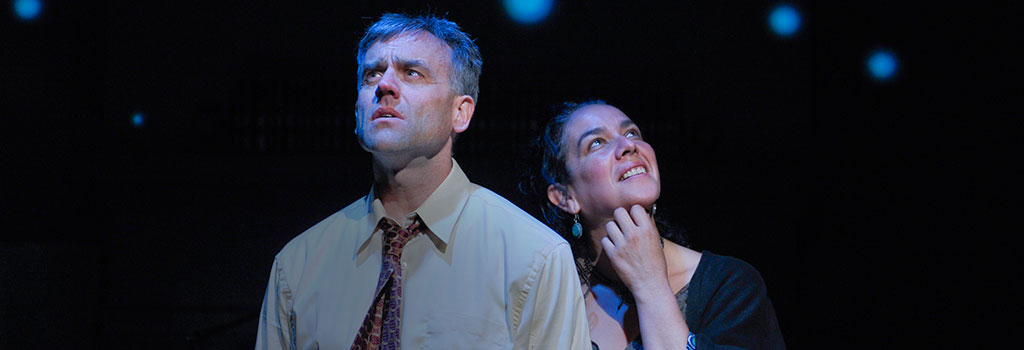
About Central Works
Marvin Greene* and Catherine Castellanos* in Blessed Unrest, 2008 (photo: David Allen)
“Central Works probably sets the highest standard in the Bay Area for consistently intelligent, provocative and relevant drama.”—Huffington Post
MISSION
Central Works’ mission is to develop and produce new plays for the theater.
VISION
We are building a community where our commitment to new plays and civic engagement flourish together.
VALUES
Central Works believes:
- New Plays are the lifeblood of a vital, relevant, and progressive theater.
- Collaboration is at the heart of everything we do.
- Diversity, Equity, and Inclusion—in our storytelling, our company, and our audiences—are fundamental to our success.
- We are committed to social justice and the exploration of pressing political issues facing our world, inviting our community to reflect, converse, and connect in civic engagement.
Click here to read our Racial Justice Statement
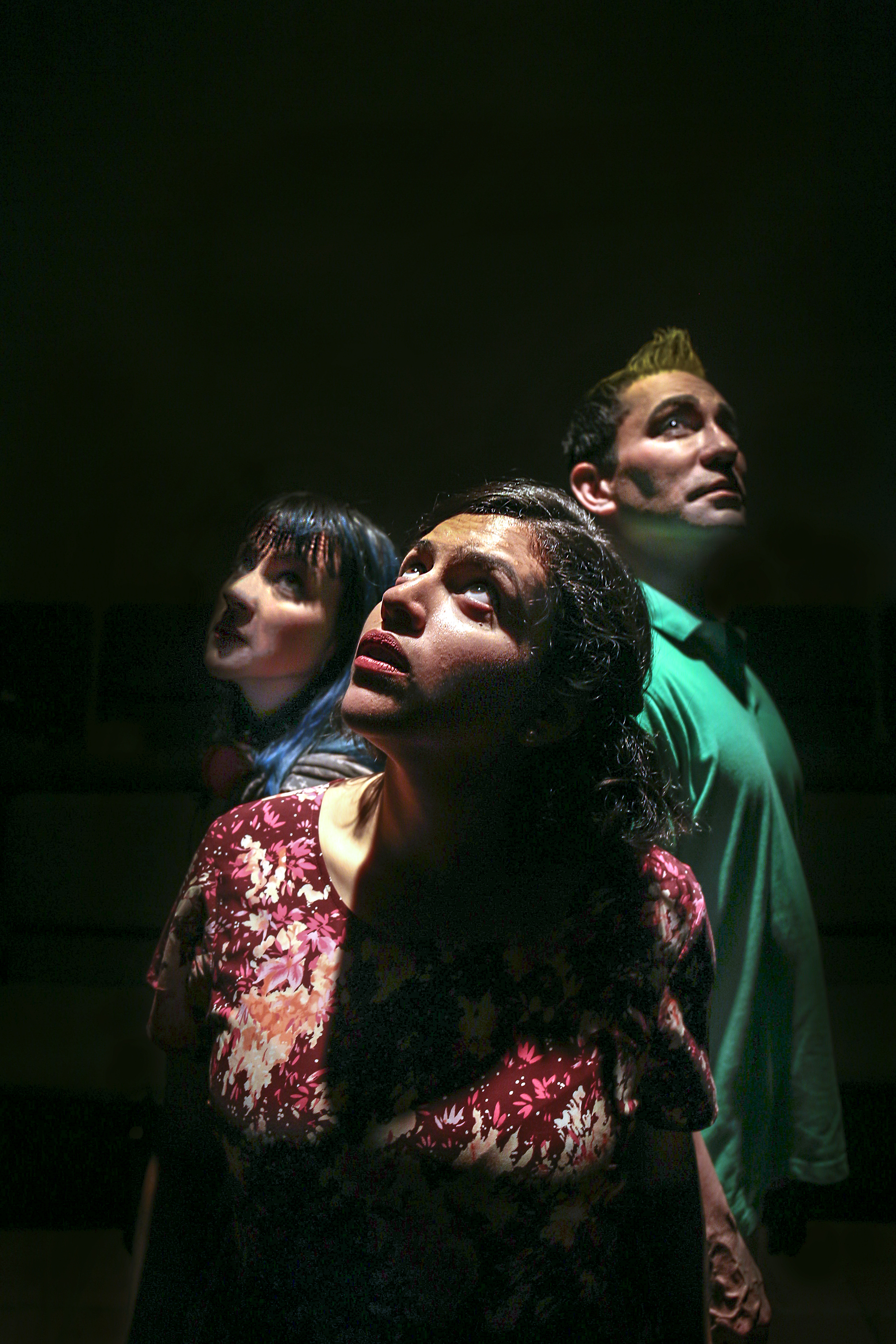
(l to r) Kitty Torres, Rudy Guerrero*, and Samanta Yunuen Cubias in Into the Beautiful North, 2016 (photo: Jim Norrena)
“Central Works is a gem-like Berkeley institution that goes on renewing itself,” Berkeley Daily Planet.
For the past 3 decades, Central Works has played a vital role in its community; we support local artists while bringing affordable, provocative world premiere plays to Bay Area audiences. Now in our 33rd season, we develop challenging new works by local playwrights. Each season, 60 or more artists, workers and volunteers participate as we perform for approximately 4,000 patrons in our unique 50-seat home at the Berkeley City Club.
Central Works fills a special niche for theater artists in the San Francisco Bay Area. We produce more new plays by local playwrights than any other company in the region. Having established a distinctive environment equally inviting to writers, designers and performers, our goal is to create a unique theatrical experience for artists and audience alike.
“Thought provoking theater not to be missed!” – SJ Mercury Times
- In the fall of 1990, Jan Zvaifler and Søren Oliver founded Central Works as an actor-driven ensemble. The company produced its first collaboratively developed new play in 1997. Since then, current co-directors Gary Graves and Jan Zvaifler have produced 37 world premieres using a distinctive process, the Central Works Method.
- The company established residency at the Berkeley City Club in 2002.
- Five years later, in 2007, the East Bay Express named Central Works “Best Small Theater Company—consistently smart, thought-provoking, and unflinching: theater for people who want to stretch their brains and have their assumptions challenged.”
- In 2009, the Wilder Green Art Fund awarded Central Works a grant of $30,000 to support the company’s New Play Program 2010–2012, a three-year initiative to develop and produce nine world premiere plays utilizing the Central Works Method. The following year, the Kenneth Rainin Foundation contributed an additional $20,000 to the program.
In 2010, The Huffington Post declared, “Central Works probably sets the highest standard in the Bay Area for consistently intelligent, provocative and relevant drama.” - In 2011, Central Works received the Paine Knickerbocker Award for outstanding achievement from the San Francisco Bay Area Theatre Critics Circle (SFBATCC). Four BroadwayWorld San Francisco awards followed, including “Best New Local Play” (Reduction in Force by Patricia Milton).
- In 2012, Central Works presented a Central Works Method Trilogy; RICHARD THE FIRST, Parts 1, 2, 3, performed in rotating rep with two sold out 8-hour marathon days. It was described in the Huffington Post as “an extremely rare theatrical event which offers a severely limited number of lucky people the chance to get the biggest bang for their theater-going bucks.”
- In 2013, the SFBATCC nominated two out of three plays in the Central Works 2012 season for “Best Original Script.” Mesmeric Revelation by Aaron Henne went on to win for “Best Original Script” and “Best Sound Design” by resident designer Gregory Scharpen.
- In 2014, the company garnered four more Critics Circle nominations for its 2013 season, including “Best Original Script” for our first Central Works Method musical, Red Virgin, a Central Works Method Play. With the introduction of the Theatre Bay Area Awards in May, both of Central Works subsequent productions received “recommended” recognition along with 3 TBA award nominations.
- In 2015, Central Works 25th anniversary season, every production received “Recommended” recognition by the TBA awards, following with another 8 nominations, including “Outstanding Production of a Musical,” “Outstanding World Premiere Musical,” (for Project Ahab, our 2nd musical) and “Outstanding World Premiere Play.” Patricia Milton’s play, Enemies: Foreign and Domestic, a product of the Central Works Writers Workshop, which opened our 25th season, garnered that final award over all of the companies in the Bay Area. Central Works also 3 received nominations from the SFBATCC for its 2014 productions, including “Original Script” for Dracula Inquest by company Co-director Gary Graves.
- In 2016, Enemies: Foreign and Domestic by Patricia Milton was nominated by the SFBATCC in 3 categories: “Original Script,” “Entire Production, East Bay” and “Entire Production, Bay Area.” Theater Bay Area named Central Works as finalists in 6 categories, including “Outstanding Production of a Play” for Ada and the Memory Engine by Lauren Gunderson.
- In 2017, we produced our second NNPN Rolling World Premiere and our third new musical, Strange Ladies by Susan Soboloff (another product of the CW Writers Workshop). Strange Ladies played to 100% capacity and was a TBA Awards finalist for “Outstanding Ensemble.”
- In 2018 Central Works was finalist in 8 categories at the TBA Awards, including “Outstanding Ensemble” (for 2 productions) and “Outstanding World Premiere Play.” It then swept the TBA Awards for Bamboozled by Patricia Milton, winning: “Outstanding Ensemble;” both available awards for “Outstanding Performance in a Principal Role” (Stacy Ross and Chelsea Bearce); and “Outstanding Production of a Play.”
- In 2018 and 2019, Central Works was recognized by the International Centre for Women Playwrights (ICWP) in its 50/50 Applause Awards, honoring theaters that produce plays written in at least equal measure by women and men.
- 2020-2021—The Pandemic Years. Central Works closed its doors in Mar, 2020. We ardently sought ways to continue to reinvent the theater, one play at a time. The script of Bystanders by Patricia Milton, originally scheduled for the stage season, was re-imagined as a radio play (“It worked perfectly as a radio play with great dramatic tension… Brilliant…”–J. Motz, KWMR). We developed a podcast series, The Central Works Script Club (like a book club with scripts and playwright interviews) that made Feedspot Media’s “Best 20 Playwriting Podcasts” list.
- 2022 brought us back in the saddle with a 3-show season of world premieres—all women playwrights and all developed in the Central Works Writers Workshop during the previous 2 years. “What I love about Central Works is that it only produces world premieres. It presents fresh new works by outstanding playwrights. Every show is a surprise — original and first seen here in Berkeley.”–E. Mendel, Berkeleyside
- In 2023, we received 9 nominations for San Francisco Bay Area Theatre Critics Circle awards for our 3 productions, and winning 5, including “Entire Production” for Escape From the Asylum (Dreaming in Cuban was also nominated for this award).
At Central Works, we take risks. We fearlessly embrace edgy, controversial issues. We are committed to developing and producing challenging new works with talented local artists and ensuring fair compensation to our workers, while maintaining affordable admission prices. We are “The New Play Theater.”

Marissa Keltie and Theo Black in A Man’s Home…, 2011 (photo: Jay Yamada)
Gary Graves
Company Co-director
Jan Zvaifler
Company Co-director
Contact us here.
Tammy Berlin
Resident Costume Designer
Deb Fink
Artistic Associate
Cristina García
Resident Playwright
Patricia Milton
Resident Playwright
John Patrick Moore
Artistic Associate
Gregory Scharpen
Resident Sound Designer/Principal Sound & Light Engineer
Kimberly Ridgeway
Artistic Associate/Artistic Leadership Resident
Natalia Rivera-Ramos
Company Stage Manager
Cheshire Isaacs
Website Design
Patricia Milton
Social Media Director
Kendra Lee Oberhauser
Program Design Specialist
General Inquiries
centralworks1@att.net
Box Office (Bridget Soto/Tiana Hanson)
centralworks1@att.net
This website was made possible with the generous support of:
Board of Directors
Vanessa Ramos
President
Deb Fink
Vice President
Gary Graves
Secretary
Craig Rice
Treasurer
Poni Bepo
Andew Carstens
Elisa Mikiten
Patricia Milton
Jeffrey Price
Sophie Rheinheimer
Viktoriia Stepanenko
Jan Zvaifler
Central Works produces new plays utilizing three basic strategies: (1) some plays are developed using the Central Works Method, (2) some are developed in the Central Works Writers Workshop, an ongoing commissioning program where twice a year, in 12-week sessions, 8 local playwrights are selected to develop projects through informal readings and carefully directed discussions, and (3) some come to the company after being developed elsewhere.
The Central Works Method is a method of collaborative play development. Though only one writer, the playwright, actually does the writing in this method, all the “collaborative partners” (the director, the actors and a few others, in addition to the playwright) are involved in the development of the script from its inception.
THE POINT OF DEPARTURE: We begin with a story, a “foundational narrative” of some sort. It can come from anywhere: a myth, an historical event, an existing short story, a classic play, any source. The writer proposes a story he or she wants to treat in the form of a play. We agree on a director. We set an opening date for the production, and we’re off. The director assembles a cast. The whole team—writer, director, actors (and maybe a few others, like our resident sound designer, Greg Scharpen)—the whole team assembles for the first workshop.
WORKSHOPS: There are ten 3-hour workshops, spaced out over approximately 6 months (sometimes longer, sometimes shorter); this is the development phase of the project. In these ten workshops, we begin by collectively researching the subject matter, we brainstorm, we problem solve, we analyze the issues involved, we uncover themes and related ideas. We follow the news. Everyone brings in anything of interest: books, articles, DVDs, music, personal experience, special experts or guests who might be able to attend workshop meetings, maybe even a field trip!—anything related to the subject matter in any way is welcomed into the formative mix.
SCRIPT SESSIONS: At some point in the workshop schedule, usually around the fourth or fifth meeting, the playwright begins to bring written material into the group as the script evolves. The developing script is read around the table, and the group discusses the material in dramaturgical terms. What seems to be working? What doesn’t? And why? We reason it out together. More brainstorming.
THE WORKSHOP DRAFT: The minimum objective of the workshop process is a complete first draft of the play by the last meeting. Sometimes playwrights complete second, third, or even subsequent drafts before the last workshop. Sometimes they don’t. But nothing has a way of focusing a playwright’s imagination (the entire partnership’s imagination) like an opening date. The fact is, you never really know what you’ve got with a new play till you open it. And run it.
THE RUN: There is no substitute for the crucible of rehearsal, opening, and run, when it comes to new play development. You need to see the play grow and settle in performance before you can tell what it really is, how audiences react to it, where it still needs work, and when you’ve got a hit on your hands. This is just one way to make a play. It takes a special set of circumstances, and, above all, a very special team. But we’ve had a lot of success with it.
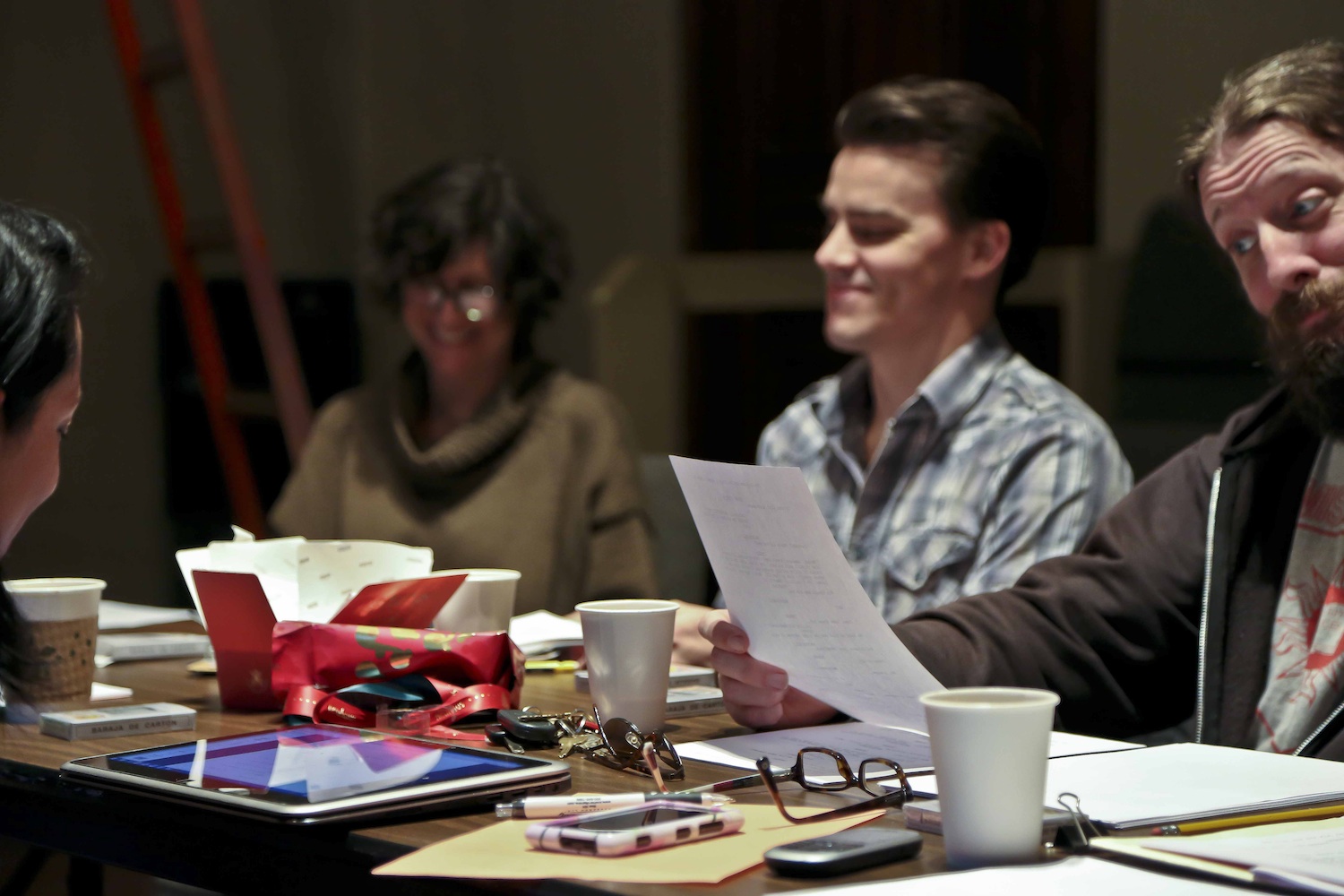
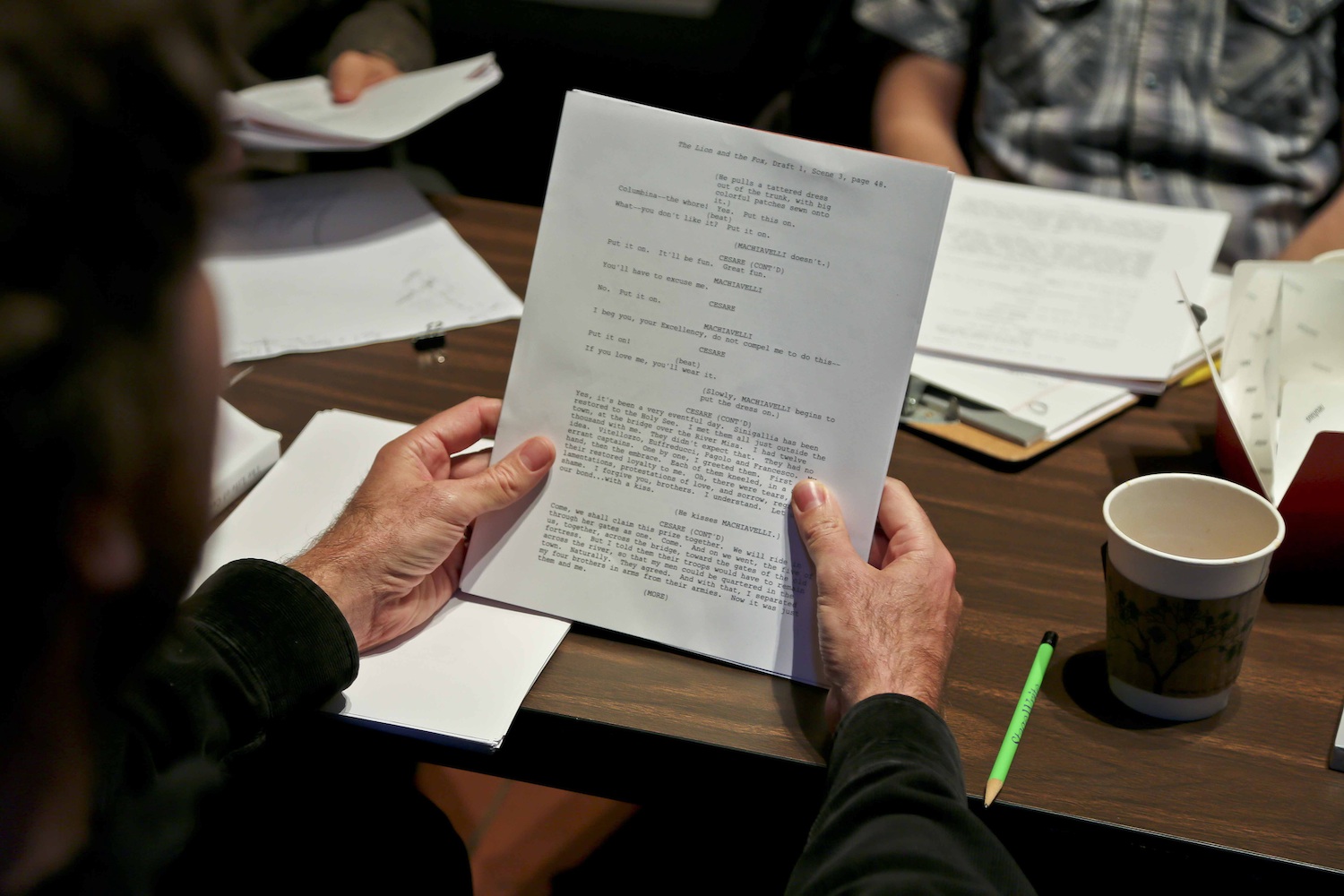
The Lion and the Fox workshop:
(top image) Vanessa Ramos, Jan Zvaifler, Benjamin Stowe, Gregory Scharpen
(lower image) Gregory Scharpen
(Photos: Jim Norrena)
(top image) Vanessa Ramos, Jan Zvaifler, Benjamin Stowe, Gregory Scharpen
(lower image) Gregory Scharpen
(Photos: Jim Norrena)
THE WRITERS WORKSHOP
with Gary Graves, Company Co-director
Since 2012, twice a year, in the spring and fall, the Central Works Writers Workshop has invited 8 playwrights to develop projects together in a 12-week structure of weekly readings and discussion. The company has produced 19 world premiere productions of scripts developed in the workshop.
The Fall 2024 Workshop: 12 meetings, 3 hours each, Saturdays, 11am to 2pm: 9/7, 9/14, 9/21, 9/28, 10/5, 10/12, 10/19, 10/26 and 4 hours each, Saturdays, 10am to 2pm: 11/2, 11/9, 11/16, 11/23. All meetings are held on Zoom.
The workshop convenes Saturdays, from 11am to 2pm (3 hrs/wk) for eight meetings, and Saturdays from 10am to 2pm (4 hrs/wk) for the last four meetings, in order to allow each writer two hours for a full read-thru of their work-in-progress by the end of the session.
The structure provides playwrights with a series of deadlines for presenting work, and a supportive group of writers who respond thoughtfully and constructively to the developing work. Limited to 8 writers. By Application. There is no cost to participate.
If you would like to join the Fall 2024 Workshop, beginning September 7, contact Gary Graves gary@centralworks.org to apply by July 1. Invitations to join the workshop will go out on July 15.
To apply, please respond to the following questions:
- Can you commit to attend all 12 meetings? If not, what dates are you unavailable to attend?
- Can you briefly describe the project you would like to develop? Projects designed with an eye for production at Central Works have a special appeal, but this is not a requirement.
- If this is your first time applying to the workshop, please provide a resume, bio or description of your playwriting experience in development and production.
The Writers Workshop at Central Works is committed to supporting writers from a diversity of cultural backgrounds.
For more information contact Gary Graves at Central Works.
***
GARY GRAVES is a director and playwright living in the San Francisco Bay Area. Since 1998, he has been a company co-director at Central Works in Berkeley, California, where he has overseen the development of over 70 world premiere productions. He holds an MFA in Playwriting from Southern Illinois U., a Ph.D. in Dramatic Art from U.C. Berkeley, and he has been teaching playwriting at the Berkeley Rep School of Theatre since 2002.
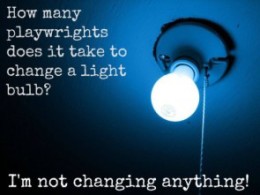
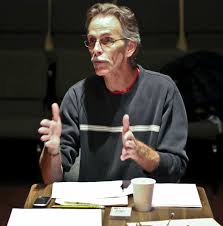
ACTORS
If you’d like to be a part of the development and production of a new play at Central Works, give the Central Works Method a careful read, and then send us your picture and resume at centralworks1@att.net or P.O. Box 9771, Berkeley CA 94709. We’ll keep your materials on hand for consideration in future projects.
WRITERS
We’re always looking for writers. But please don’t send us a script you want us to produce. If you’re an experienced playwright, and you think you might like to develop a play with us, give the Central Works Method a careful read, and then contact us at gary@centralworks.org with a proposal.
VOLUNTEERS
Would you like to be a part of Central Works? We always need volunteers to help in the box office, ushering, or ESPECIALLY at our mailing parties. Just contact us and let us know how you’d like to help.
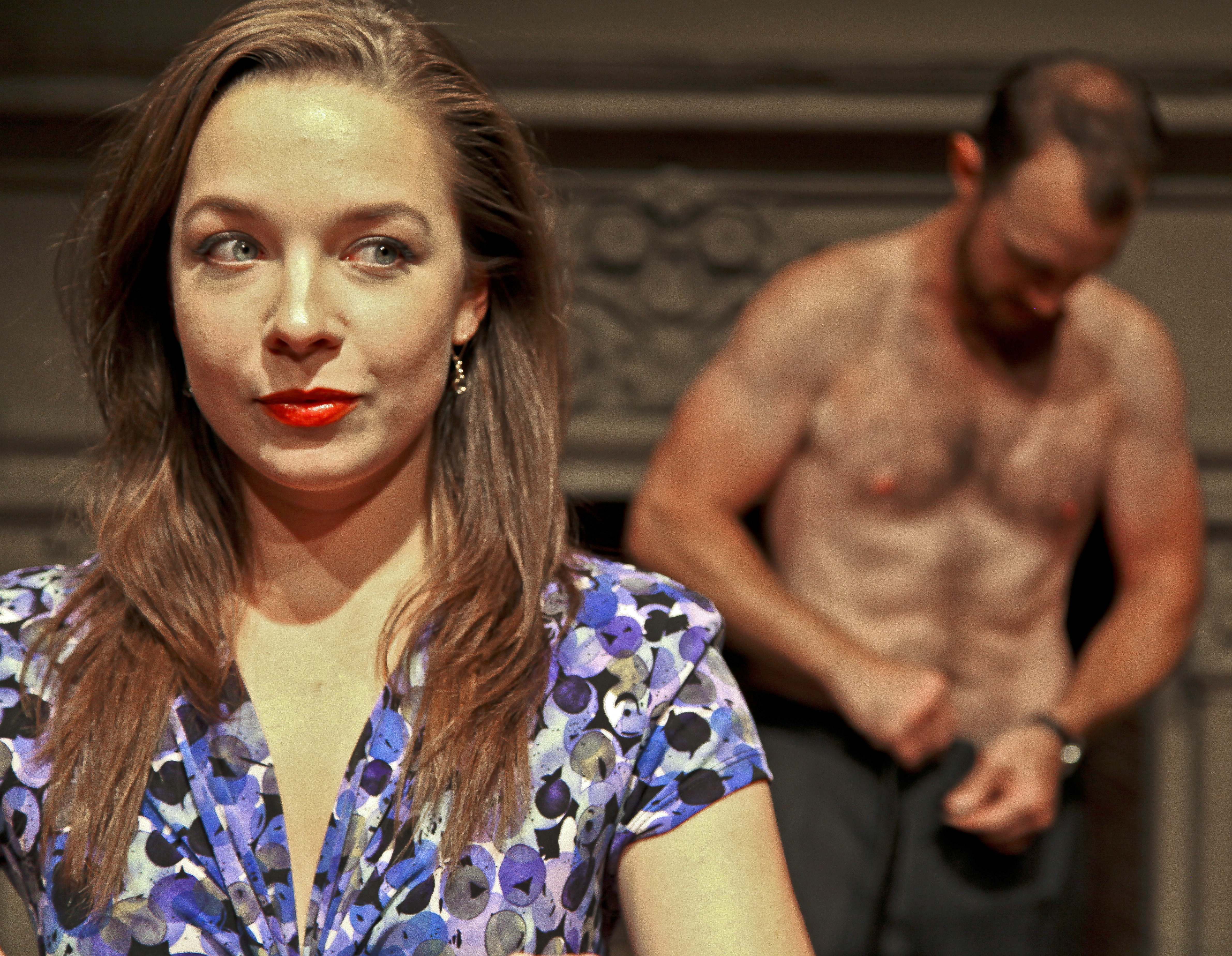
Maggie Mason and Brian Trybom in Pitch Perfect, 2013 (photo: Jim Norrena)




